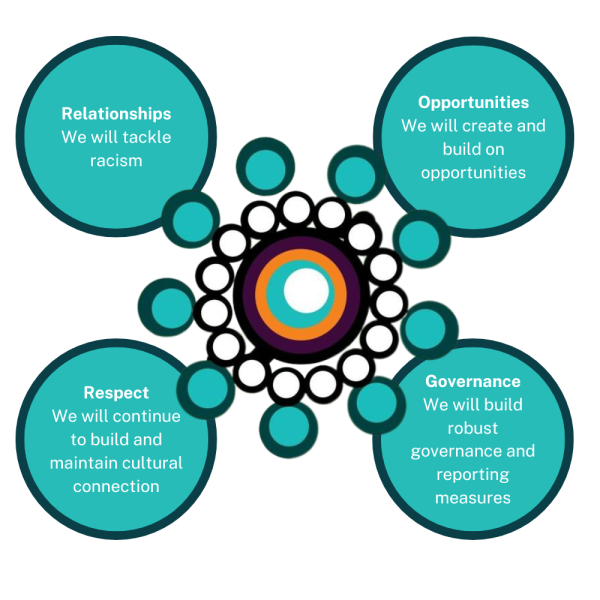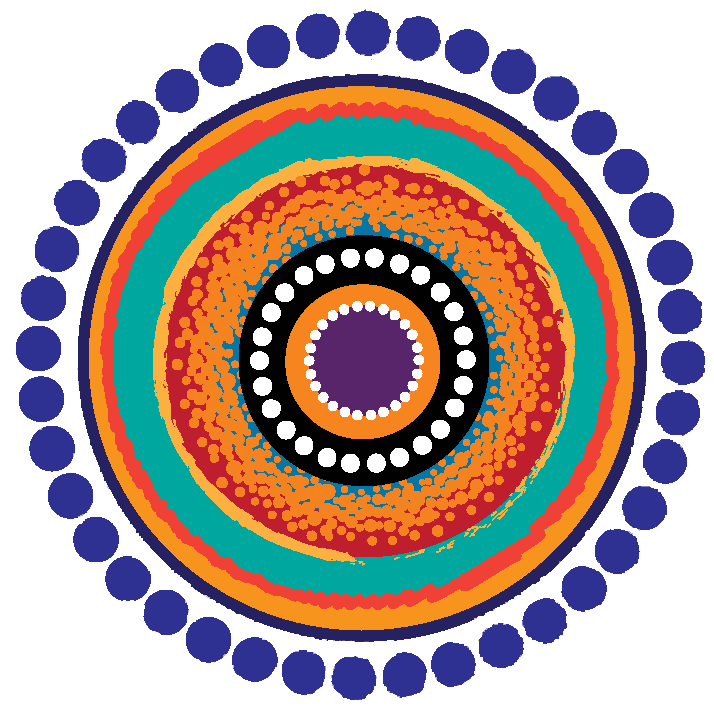Request accessible format of this publication.
About our RAP
Our plan on a page
Vision
To deliver a framework for non-Indigenous staff to build relationships with Aboriginal and Torres Strait Islander peoples, partner organisations, patients, families, and carers.
We will work collaboratively to achieve the common goal of marked improvements of health outcomes for Aboriginal and Torres Strait Islander people based on the needs identified by our Aboriginal Community.

Our actions will be based on the fundamentals of Opportunity, Respect & Relationships.
Our vision will become a reality by working together to create and maintain respectful relationships with Aboriginal people.
We will value the contribution of Aboriginal culture to overall health and wellbeing and undertake true co-design of services in partnership with Aboriginal people.
We will ensure that Aboriginal patient, family and carer experience is at the centre of what we do.
To achieve this vision we must accept and acknowledge past actions, the harm caused to the health and wellbeing of Aboriginal people, and the impact that this harm continues to have on Aboriginal people and communities today.
Our RAP
This Innovate RAP June 2023 – June 2025 is a key component in making Meaningful Gains in Aboriginal Health.
Our RAP June 2023 – June 2025 has been developed under the sponsorship of the Executive Director Aboriginal Health and Wellbeing and the WNSWLHD Chief Executive. It has been produced with support and guidance from the RAP Governance Committee which includes six Aboriginal and Torres Strait Islander people and seven non-Indigenous people.
Consultation with our staff and partners has been integral in informing our vision for reconciliation and the actions that we commit to delivering in this plan. We extend our thanks to everyone who contributed to this process.
Reconciliation means many things to many people, but at its heart it is about coming together to strengthen relationships. Reconciliation is built on the understanding and acceptance of our shared history and the impact that dispossession, persecution and racism have had on Aboriginal and Torres Strait Islander people.
Achieving reconciliation is key to closing the gap in health outcomes and life expectancy between Aboriginal and Torres Strait Islander people and non–Indigenous people.
In a health context, reconciliation must also acknowledge that poorer health outcomes experienced by Aboriginal and Torres Strait Islander people today are borne in part by the social determinants of health.
Our Health service recognises the impacts of the historical lack of focus on culturally safe models of care and health delivery strategies tailored toward the needs identified and experienced in each individual community.
Mark Spittal | Chief Executive |
Brendon Cutmore | Executive Director Aboriginal Health and Wellbeing |
Sharon McKay | Acting Executive Director Operations |
Angela Firth | Manager Planning and Service Development |
Ashleigh Marsland | Facility Flow Manager, Bathurst Health Service |
Bethany Schofield | Physiotherapy Education Partner |
Dianne Harvey | Associate Director Allied Health |
Donna Stanley | District Coordinator Aboriginal Mental Health Drug & Alcohol / Acting Director Aboriginal Health |
Fiona Ostini | Redevelopment Change Manager |
Lesa Towers | Manager Aboriginal Workforce Capability, Development and Culture |
Meg Tuipulotu | Patient Safety Coordinator, Dubbo Health Service |
Tracy Zachariya | Clinical Nurse Specialist, Mental Health Drug and Alcohol |
Pat Canty | Aboriginal Health Manager – Strategic Partnerships |
Our reconciliation journey so far
What reconciliation means to us
We asked our staff and partners what reconciliation means to them, and the majority of responses reflected unity, collaboration, and respect.
We are proud to have been the first NSW LHD to develop a RAP in 2017, with implementation from 2017 to 2019.
We recognise that our journey towards reconciliation is a long-term commitment and requires concerted and cohesive action.
We learn from our previous RAP and are committed to achieving meaningful and measurable actions. We celebrate our accomplishments, and acknowledge deliverables that were not achieved.
We choose to see it as an opportunity to revaluate our influence and areas of strength, narrow our focus, address our shortcomings, and reinvigorate enthusiasm towards actions.
We will continue to be ambitious and where we have previously faltered.
We will undertake true work within community to demonstrate our commitment.
We will deliver co-designed, high quality, culturally safe and responsive health care that is embedded in practice. Our care will be tailored to achieve improved engagement and health outcomes for Aboriginal and Torres Strait Islander people.
This RAP builds on the actions outlined in our 2017 – 2019 Inaugural Innovate RAP.
Our achievements to date include:
- introducing cultural protocols across all facilities and services
- delivering Aboriginal and Torres Strait Islander Arts, Signage, and Cultural Gardens to 18 facilities
- rolling out cultural awareness training with a 72% staff completion rate for the face-to-face component
- increasing Aboriginal and Torres Strait Islander staff employment from 3.4% in 2014 to 7.0% in 2022
- increasing representation of Aboriginal and Torres Strait Islander staff in leadership roles
- facilitating cultural immersion experiences for our Board and Executive Leadership Team
- celebrating NAIDOC Week and Reconciliation Week across all facilities.
